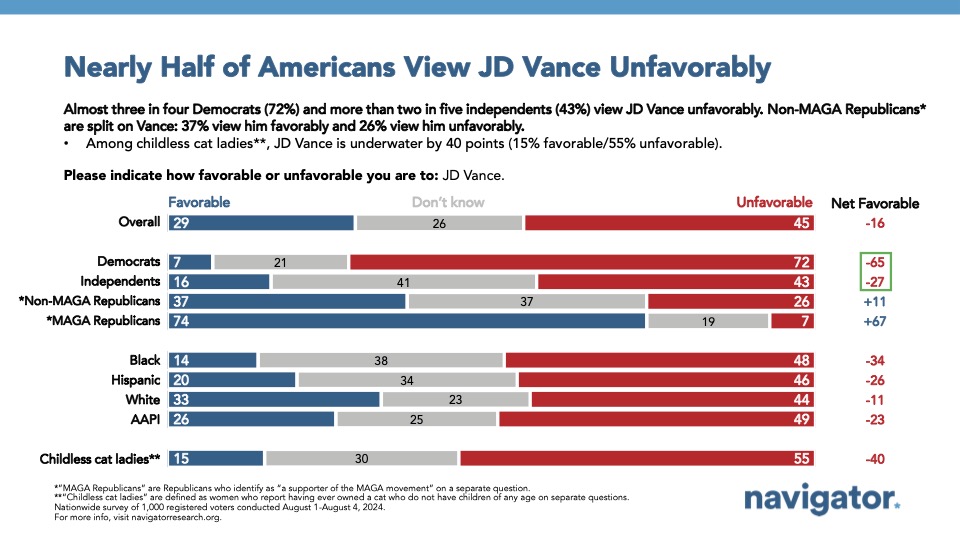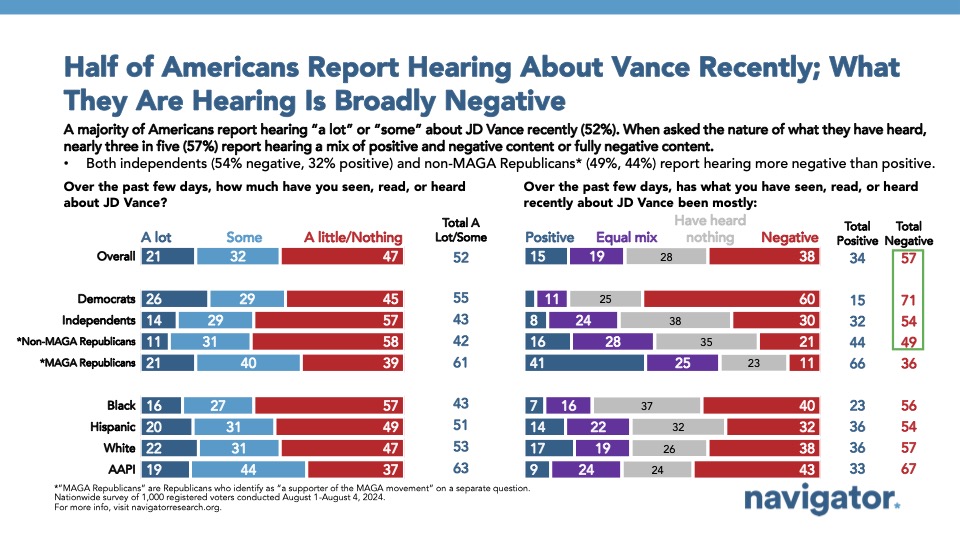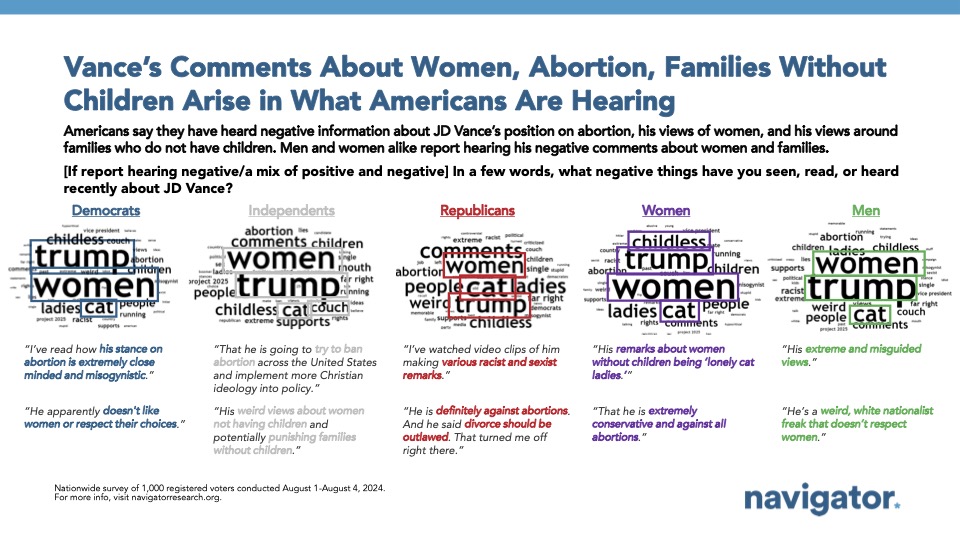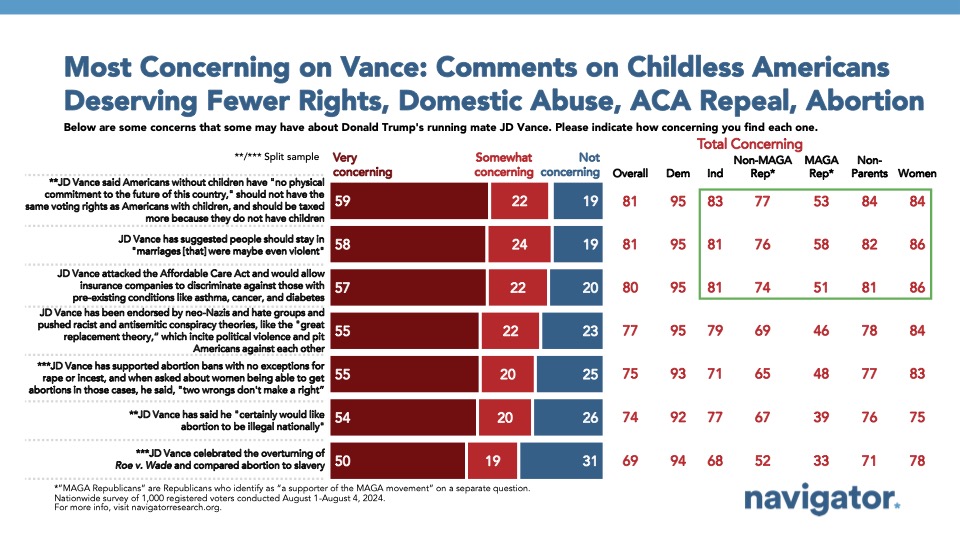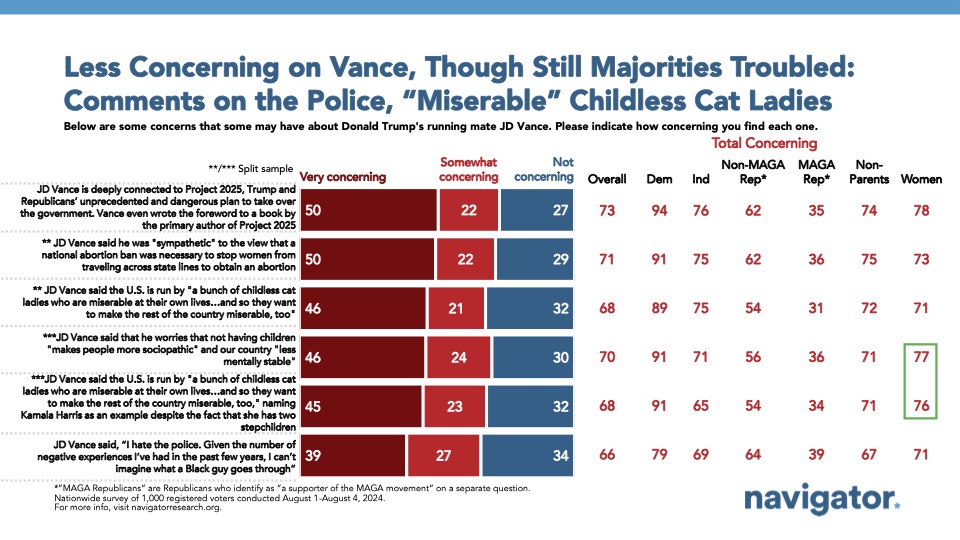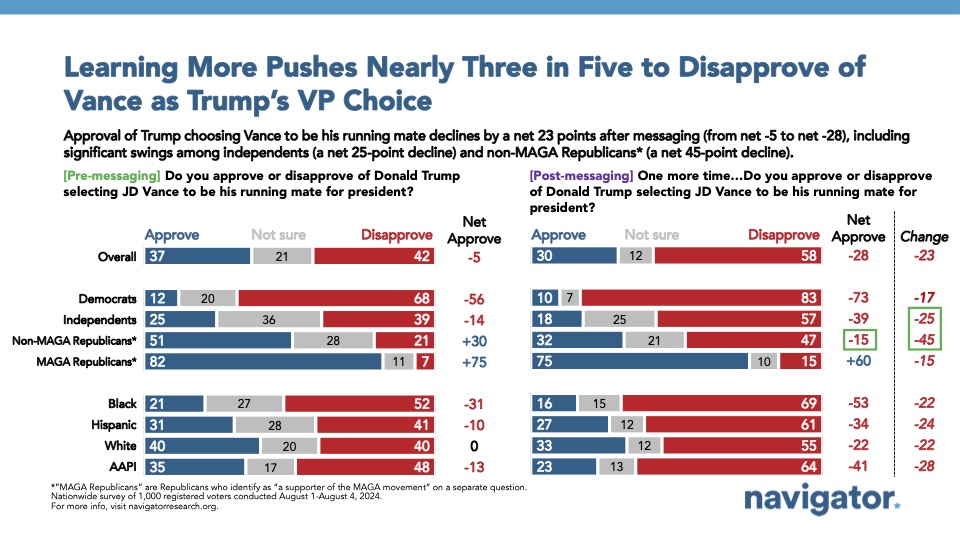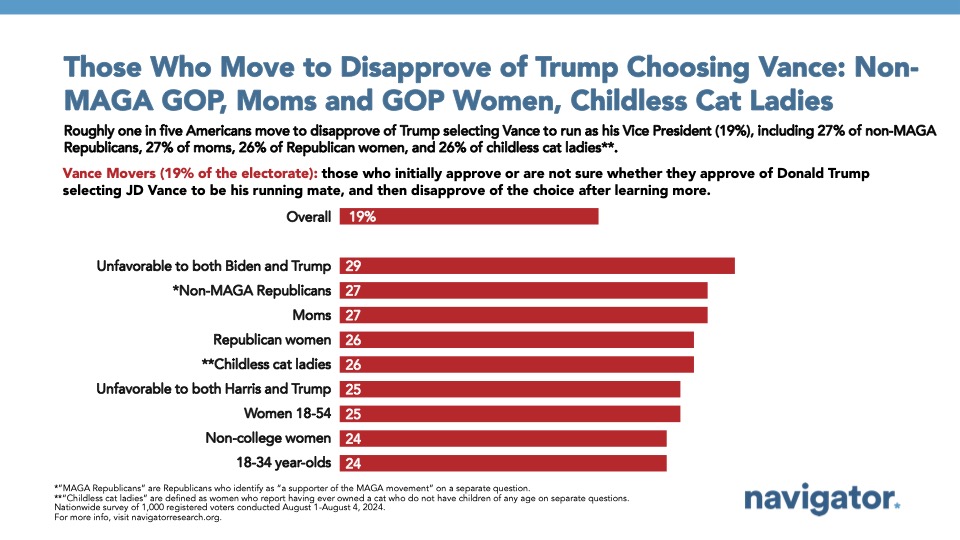Poll: JD Vance
This Navigator Research report contains polling data on how Americans evaluate JD Vance now that he has been nominated as the Republican vice presidential nominee, including what Americans have been hearing about him since becoming the nominee and the level of concern Americans have about some of his statements and stances.
JD Vance is deeply unpopular, with nearly three in five Americans hearing negative news about him recently.
Nearly half of Americans view Senator JD Vance unfavorably and nearly three in five say they have seen, read, or heard at least some negative news about him recently. Following former President Trump’s selection of Vance as the Republican vice presidential nominee, just 29 percent of Americans overall have a favorable view of Vance while 45 percent of Americans say they view him unfavorably, including seven in ten Democrats (net -65; 7 percent favorable – 72 percent unfavorable) and a plurality of independents (net -27; 16 percent favorable – 43 percent unfavorable). While a majority of Republicans view Vance favorably (net +40; 56 percent favorable – 16 percent unfavorable), Republicans who identify with the MAGA movement view Vance much more favorably (net +67; 74 percent favorable – 7 percent unfavorable) while non-MAGA Republicans are much more split on their views of him (net +11; 37 percent favorable – 26 percent unfavorable).
- A majority of Americans without children view Vance unfavorably (net -27; 25 percent favorable – 52 percent unfavorable); a narrower plurality of Americans who are parents are unfavorable toward him (net -7; 32 percent favorable – 39 percent unfavorable).
- Americans who are “childless cat ladies” — those who both own cats and do not have children — view Vance unfavorably by a 40-point margin (15 percent favorable – 55 percent unfavorable).
- Nearly three in five Americans have seen, read, or heard at least some negative news about Vance recently (57 percent, with 38 percent reporting news about Vance has been “mostly negative”). When asked specifically what negative news Americans have heard, most cite “Trump,” “women,” “childless,” and “cat.”
Americans find Vance’s comments on childless Americans, domestic abuse, and the Affordable Care Act most concerning.
Among a range of statements made by Vance, four in five are concerned that “JD Vance said Americans without children have ‘no physical commitment to the future of this country,’ should not have the same voting rights as Americans with children, and should be taxed more because they do not have children” (81 percent find this concerning, including 59 percent who find it “very” concerning), that “JD Vance has suggested people should stay in ‘marriages [that] were maybe even violent’” (81 percent find this concerning, including 58 percent who find it “very” concerning), and that “JD Vance attacked the Affordable Care Act and would allow insurance companies to discriminate against those with pre-existing conditions like asthma, cancer, and diabetes” (80 percent find this concerning, including 57 percent who find it “very” concerning). Other deeply concerning statements include that:
- JD Vance has been endorsed by neo-Nazis and hate groups and pushed racist and antisemitic conspiracy theories, like the “great replacement theory,” which incite political violence and pit Americans against each other (77 percent find this concerning, including 55 percent who find it “very” concerning);
- JD Vance has supported abortion bans with no exceptions for rape or incest, and when asked about women being able to get abortions in those cases, he said, “two wrongs don’t make a right” (75 percent find this concerning, including 55 percent who find it “very” concerning); and,
- JD Vance has said he “certainly would like abortion to be illegal nationally” (74 percent find this concerning, including 54 percent who find it “very” concerning).
After reading Vance’s comments and stances, disapproval of Trump’s selection of Vance as the Republican vice presidential nominee increases by a net 23 points.
Initially, Americans say they disapprove of Donald Trump selecting JD Vance to be his vice presidential nominee by 5 points (37 percent approve – 42 percent disapprove), including independents who disapprove by 14 points (25 percent approve – 39 percent disapprove). After reading statements and comments made by Vance, net disapproval of Trump’s selection of Vance shifts from net -5 to net -28 (30 percent approve – 58 percent disapprove), including a 25-point negative shift among independents (net -39; 18 percent approve – 57 percent disapprove) and a 45-point negative shift among non-MAGA Republicans (net -15; 32 percent approve – 47 percent disapprove).
- More than three in four Americans who own cats and do not have children disapprove of Trump’s selection of Vance after reading statements and comments he has made (net -61; 16 percent approve – 77 percent disapprove), as do a majority of parents (net -23; 32 percent approve – 55 percent disapprove).
- Groups that are more likely to initially approve of or who are unsure whether they approve of Trump’s selection of Vance, but shift toward disapproving of the choice after learning more, include those who view both President Biden and Trump unfavorably (29 percent), Republicans who do not support the MAGA movement (27 percent), and moms (27 percent).
About The Study
Global Strategy Group conducted a public opinion survey among a sample of 1,000 registered voters from August 1-August 4, 2024. 100 additional interviews were conducted among Hispanic voters. 75 additional interviews were conducted among Asian American and Pacific Islander voters. 100 additional interviews were conducted among African American voters. 100 additional interviews were conducted among independent voters. 200 additional interviews were conducted among voters ages 18-34. The survey was conducted online, recruiting respondents from an opt-in online panel vendor. Respondents were verified against a voter file and special care was taken to ensure the demographic composition of our sample matched that of the national registered voter population across a variety of demographic variables. The margin of error for the full sample at the 95 percent level of confidence is +/- 3.1 percentage points. The margin for error for subgroups varies and is higher.

